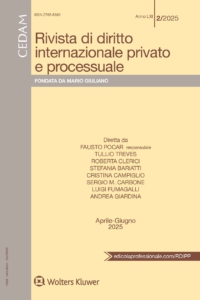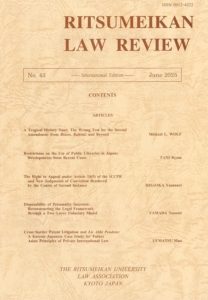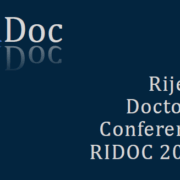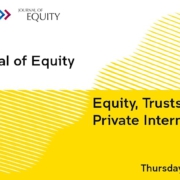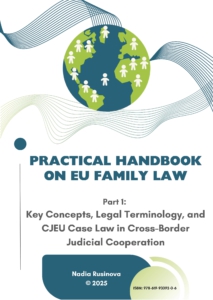 Family law in the European Union is an intricate, fast-evolving, and politically sensitive area of judicial cooperation. With issues ranging from cross-border divorce to international child abduction, and from parental responsibility to maintenance obligations, practitioners and judges must constantly navigate overlapping instruments, shifting jurisdictional rules, and complex interactions between national and EU law.
Family law in the European Union is an intricate, fast-evolving, and politically sensitive area of judicial cooperation. With issues ranging from cross-border divorce to international child abduction, and from parental responsibility to maintenance obligations, practitioners and judges must constantly navigate overlapping instruments, shifting jurisdictional rules, and complex interactions between national and EU law.
The Practical Handbook on EU Family Law: Part I – Key Concepts, Legal Terminology, and CJEU Case Law in Cross-Border Judicial Cooperation, authored by Nadia Rusinova and freely available online for download, positions itself as a much-needed companion in this field. Drawing on the Court of Justice of the European Union’s jurisprudence and the architecture of EU family law, the handbook provides a clear roadmap through legal terminology, concepts, and cross-instrument mechanisms.
Structure and Foundations
The opening Unit 1 sets the stage by outlining the purpose, audience, and method of the handbook. It presents itself as a practical tool designed to support judges, lawyers, academics, and students in navigating the complexities of cross-border family cases. Particularly noteworthy is the emphasis on English as a tool of legal harmonization, highlighting its role as a neutral bridge across diverse national legal systems and a means of fostering greater coherence in judicial cooperation.
EU Family Law in Context
Unit 2 provides the legal and institutional backdrop. It introduces the competence of the EU under Article 81 TFEU, the limits imposed by the special legislative procedure, and the use of enhanced cooperation (e.g., in matrimonial property regimes). It also offers a historical overview, tracing family law’s evolution within the broader framework of judicial cooperation in civil matters. The treatment of the Brussels II system is especially helpful in showing how successive instruments have created the backbone of today’s EU family law. For readers less familiar with EU competences, the discussion of direct applicability, primacy, and the role of domestic courts situates family law firmly within the EU’s constitutional order.
Cross-Instrument Legal Concepts
The third unit is a central part of the handbook, bringing together core legal concepts that recur across family law instruments. These include:
- Structural terms: “civil matters”, “court”, “habitual residence”, “central authorities”.
- Applicable law concepts: universal application, renvoi, and party autonomy.
- Safeguards: public policy and the best interests of the child.
- Jurisdictional coordination: lis pendens, related actions, prorogation, residual jurisdiction.
- Recognition and enforcement: the circulation of decisions, exequatur, enforcement measures, and grounds for refusal.
This cross-instrument perspective demonstrates how family law rules form part of a system of judicial cooperation, requiring coherent interpretation across instruments. The integration of CJEU case law grounds the discussion in practice.
Matrimonial Matters
Unit 4 turns to marriage-related proceedings: divorce, legal separation, annulment, and the recognition of non-judicial divorces involving public authorities. The coverage of jurisdictional bases (such as the habitual residence of spouses and counterclaims) and the recognition of decisions highlights the challenges courts face when marriages break down across borders.
Parental Responsibility
One of the most sensitive aspects of family law, Unit 5 addresses custody, access rights, and parental responsibility. Concepts such as continuing jurisdiction, transfer of jurisdiction, and urgent measures are explained with clarity. The section on perpetuatio fori, which ensures stability of jurisdiction once proceedings are initiated, is particularly insightful. The discussion of enforcement balances the importance of privileged decisions (such as those automatically enforceable) with the role of coercive and non-coercive measures in practice.
International Child Abduction
Unit 6 provides a well-structured synthesis of the 1980 Hague Convention and the EU’s overriding mechanism. It covers wrongful removal or retention, return procedures, and exceptions such as grave risk of harm or settlement of the child. The attention to post-decision scenario, such as further abduction or non-compliance, demonstrates the handbook’s practical orientation and awareness of the complexities courts encounter in real-world cases.
Maintenance Obligations
Unit 7 completes the thematic coverage with maintenance obligations. It clarifies terminology (creditor, debtor, subrogation of public bodies) and explains jurisdictional bases, including forum necessitatis, which safeguards access to justice where no other court is available. The treatment of applicable law and the recognition and enforcement of maintenance decisions is highly useful for practitioners managing the financial dimensions of cross-border disputes.
Annexes and Added Value
The annexes provide a set of especially useful practical tools:
- An alphabetical glossary of terms for quick reference.
- Tables and figures that map out jurisdictional rules and procedures.
- CJEU case law indexed by legal term.
In Conclusion
With this work, Nadia Rusinova has produced a handbook that renders EU family law accessible, well-structured, and firmly practice-oriented, while at the same time combining doctrinal depth with methodological precision. This dual quality enables the handbook to serve not only as a reliable guide for practitioners confronted with cross-border family law issues, but also as a valuable scholarly contribution to the academic study of EU judicial cooperation. Its layered design – beginning with foundational principles, moving through cross-cutting concepts, and then addressing specific domains – makes the handbook equally indispensable for lawyers, judges, and academics alike.
Congratulations, Nadia!


